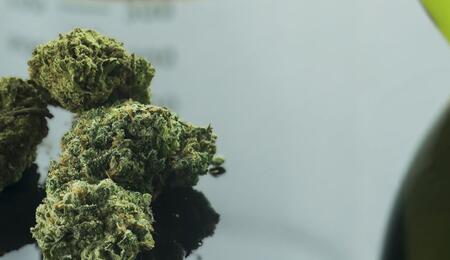Hemp Biodiesel for the future

A Truly Viable Solution for our Future Energy Needs
Biodiesel is the blanket term for a group of long-chain, mono-alkyl ester oxygenated fuels made from plant oil or animal fat, catalyzed with alcohol. It is unique amongst alternative fuels in that any diesel engine can run on it without the need for special modification. Biodiesel is non-toxic, has a high combustion temperature, compared with petroleum diesel, and is therefore safer to store and transport. Emissions are cleaner, and costs are competitive.
As an oilseed crop, hemp has been known as a good alternative to petrochemical fuels for over a century. Unsurprisingly, much past reluctance to conduct serious research can be explained by the traditional intolerance to a crop that some governments still refuse to view in its own right, as separate from marijuana in growth patterns and requirements. Now, biofuels are increasingly attractive, discussed at length in political discourse, and subject to exploding demand. Beyond being the choice of the environmentally-conscious, it is a question of growing insecurity over future energy sources that now drives this biofuel frenzy. With biodiesel representing a small but explosively growing segment of the global market for diesel, the hunt is on for the best oilseed crop - and hemp is a very strong contender, indeed.
Hemp leaves the soil in a better state than it finds it, absorbs as much CO2 as will be used in its combustion, can grow on infertile ground much faster than other biofuel crops, and offers higher yields of usable feedstock per hectare. As one of the biggest arguments against biofuel is the environmental damage by pesticide- and fertilizer-hungry crops, which leave good soil exhausted, hemp would seem a hugely viable alternative. Hemp can be used to produce various forms of fuel, from different parts of the plant. Hemp biodiesel exhibits all the expected positive traits; as well as the important characteristic of functionality at low temperatures, unlike other biodiesels that may become gelid and inoperable as molecules aggregate to form crystals.
However, one of the major arguments against biofuels in general is that to provide enough to supply the whole of, say, the USA's energy needs, a huge amount of land would need to be set aside - quite possibly from our diminishing untouched wilderness - for large-scale monoculture of a single crop. This in itself is worrying, although estimates suggest that 6% of the USA's total area could provide the country's entire biomass requirements - a potentially manageable figure. Of course, the usual reaction of Western corporations in this scenario is to simply buy up chunks of less developed countries, a growing and short-sighted trend.
Although monoculture of hemp is arguably less damaging than that of most crops, it is nonetheless vital that future developments with hemp biodiesel are realized within an environmentally- and politically sound framework, to adequately present sustainable alternatives to current practices. Intrusive rainforest-clearing initiatives to provide cropland for soybeans and the like have been roundly criticized in the media, and rightly so - it is important not to see repeats of these complaints with hemp.
Biofuels represent one aspect of hemp research where the US may well be ahead of most other nations. Many European governments seem to be completely unaware of the plant's biofuel potential, despite actively encouraging research and development in other areas, such as plastics and building materials. In the US, on the other hand, several organizations are actively investigating hemp. Investment in biofuel has been significant: the US recently overtook Brazil as the world's largest ethanol producer. The US military has even been investigating biofuels for supersonic jets over the last few years.
Bio-ethanol accounts for about 90% of total biofuel production, so any unexplored sources are taken increasingly seriously. As well as biodiesel from hemp seeds, ethanol and methanol can be produced from waste (woody and starchy) materials by gasification and acid hydrolysis - ten times more efficiently than corn, the current ethanol crop of choice. The potential profit in biofuel is encouraging further research into hemp as a feedstock.
Last October, the University of Connecticut unveiled plans to build a plant capable of processing hemp into 200,000 gallons of biodiesel annually, funded by a $1.8 million grant from the Department of Energy. This rate of production is small, but the facility is intended to be used for experimental research into future large-scale production methods, rather than to itself providing energy for the masses. The University holds a patent for a specific design of reactor system that converts hemp-seed oil and other feedstocks with an efficiency rate of up to 97%, following research involving conversion of the virgin oil through a method known as transesterification. Their process involves use of methanol, isopropyl and lye, which separate the glycerol and other waste products from the hemp seed oil to produce methyl ester.
This obvious interest in hemp from a federal agency such as the DoE is almost unheard of - and highly significant. If successful, this initiative could pave the way for many like it, increasing the necessity for domestic production yet further. Currently, the major obstacle to more widespread implementation of hemp biofuel is high cost and lack of availability.
In Canada, and much of Europe, cultivation of hemp is still a niche industry, such that available harvests are quickly snapped up at a premium by health food manufacturers and producers of expensive ethical textiles. As production increases, costs are anticipated to decrease, and more consistent supplies will become available for biomass needs. With awareness of hemp as biofuel increasing throughout the world, it is to be hoped that enlightened and strategic decisions for funding allocations will continue to be made, and the growth of this inspiring industry will continue unabated.
S
Soft Secrets



